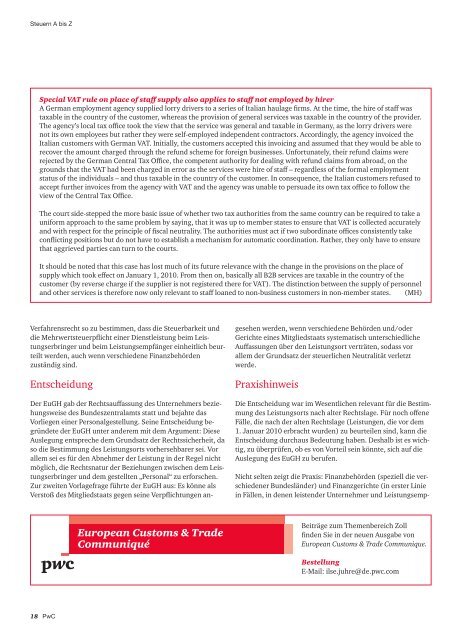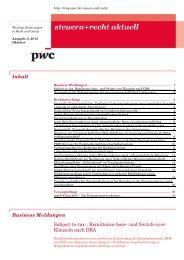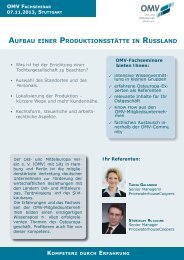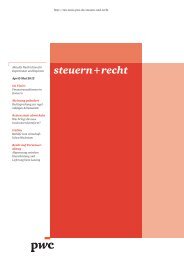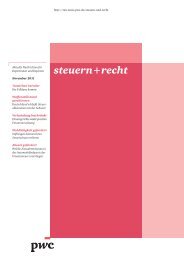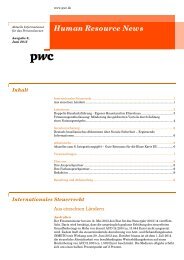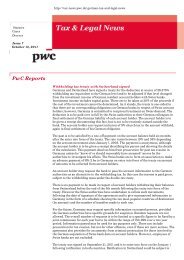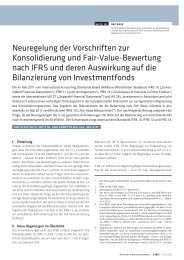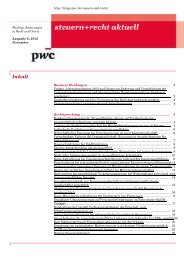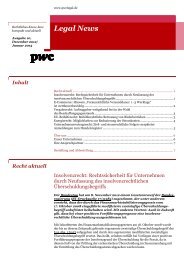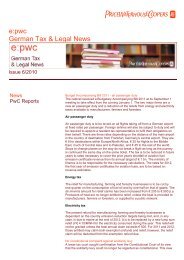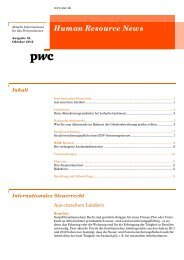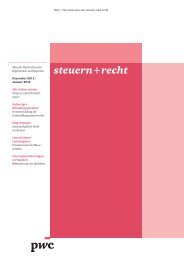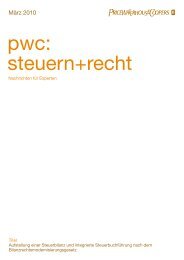steuernrecht_2_2012 herunterladen - PwC Blogs
steuernrecht_2_2012 herunterladen - PwC Blogs
steuernrecht_2_2012 herunterladen - PwC Blogs
Sie wollen auch ein ePaper? Erhöhen Sie die Reichweite Ihrer Titel.
YUMPU macht aus Druck-PDFs automatisch weboptimierte ePaper, die Google liebt.
Steuern A bis Z<br />
Special VAT rule on place of staff supply also applies to staff not employed by hirer<br />
A German employment agency supplied lorry drivers to a series of Italian haulage firms. At the time, the hire of staff was<br />
taxable in the country of the customer, whereas the provision of general services was taxable in the country of the provider.<br />
The agency’s local tax office took the view that the service was general and taxable in Germany, as the lorry drivers were<br />
not its own employees but rather they were self-employed independent contractors. Accordingly, the agency invoiced the<br />
Italian customers with German VAT. Initially, the customers accepted this invoicing and assumed that they would be able to<br />
recover the amount charged through the refund scheme for foreign businesses. Unfortunately, their refund claims were<br />
rejected by the German Central Tax Office, the competent authority for dealing with refund claims from abroad, on the<br />
grounds that the VAT had been charged in error as the services were hire of staff – regardless of the formal employment<br />
status of the individuals – and thus taxable in the country of the customer. In consequence, the Italian customers refused to<br />
accept further invoices from the agency with VAT and the agency was unable to persuade its own tax office to follow the<br />
view of the Central Tax Office.<br />
The court side-stepped the more basic issue of whether two tax authorities from the same country can be required to take a<br />
uniform approach to the same problem by saying, that it was up to member states to ensure that VAT is collected accurately<br />
and with respect for the principle of fiscal neutrality. The authorities must act if two subordinate offices consistently take<br />
conflicting positions but do not have to establish a mechanism for automatic coordination. Rather, they only have to ensure<br />
that aggrieved parties can turn to the courts.<br />
It should be noted that this case has lost much of its future relevance with the change in the provisions on the place of<br />
supply which took effect on January 1, 2010. From then on, basically all B2B services are taxable in the country of the<br />
customer (by reverse charge if the supplier is not registered there for VAT). The distinction between the supply of personnel<br />
and other services is therefore now only relevant to staff loaned to non-business customers in non-member states. (MH)<br />
Verfahrensrecht so zu bestimmen, dass die Steuerbarkeit und<br />
die Mehrwertsteuerpflicht einer Dienstleistung beim Leistungserbringer<br />
und beim Leistungsempfänger einheitlich beurteilt<br />
werden, auch wenn verschiedene Finanzbehörden<br />
zuständig sind.<br />
Entscheidung<br />
Der EuGH gab der Rechtsauffassung des Unternehmers beziehungsweise<br />
des Bundeszentralamts statt und bejahte das<br />
Vorliegen einer Personalgestellung. Seine Entscheidung begründete<br />
der EuGH unter anderem mit dem Argument: Diese<br />
Auslegung entspreche dem Grundsatz der Rechtssicherheit, da<br />
so die Bestimmung des Leistungsorts vorhersehbarer sei. Vor<br />
allem sei es für den Abnehmer der Leistung in der Regel nicht<br />
möglich, die Rechtsnatur der Beziehungen zwischen dem Leistungserbringer<br />
und dem gestellten „Personal“ zu erforschen.<br />
Zur zweiten Vorlagefrage führte der EuGH aus: Es könne als<br />
Verstoß des Mitgliedstaats gegen seine Verpflichtungen an-<br />
18 <strong>PwC</strong><br />
European Customs & Trade<br />
Communiqué<br />
gesehen werden, wenn verschiedene Behörden und/oder<br />
Gerichte eines Mitgliedstaats systematisch unterschiedliche<br />
Auffassungen über den Leistungsort verträten, sodass vor<br />
allem der Grundsatz der steuerlichen Neutralität verletzt<br />
werde.<br />
Praxishinweis<br />
Die Entscheidung war im Wesentlichen relevant für die Bestimmung<br />
des Leistungsorts nach alter Rechtslage. Für noch offene<br />
Fälle, die nach der alten Rechtslage (Leistungen, die vor dem<br />
1. Januar 2010 erbracht wurden) zu beurteilen sind, kann die<br />
Entscheidung durchaus Bedeutung haben. Deshalb ist es wichtig,<br />
zu überprüfen, ob es von Vorteil sein könnte, sich auf die<br />
Auslegung des EuGH zu berufen.<br />
Nicht selten zeigt die Praxis: Finanzbehörden (speziell die verschiedener<br />
Bundesländer) und Finanzgerichte (in erster Linie<br />
in Fällen, in denen leistender Unternehmer und Leistungsemp-<br />
Beiträge zum Themenbereich Zoll<br />
finden Sie in der neuen Ausgabe von<br />
European Customs & Trade Communique.<br />
Bestellung<br />
E-Mail: ilse.juhre@de.pwc.com


